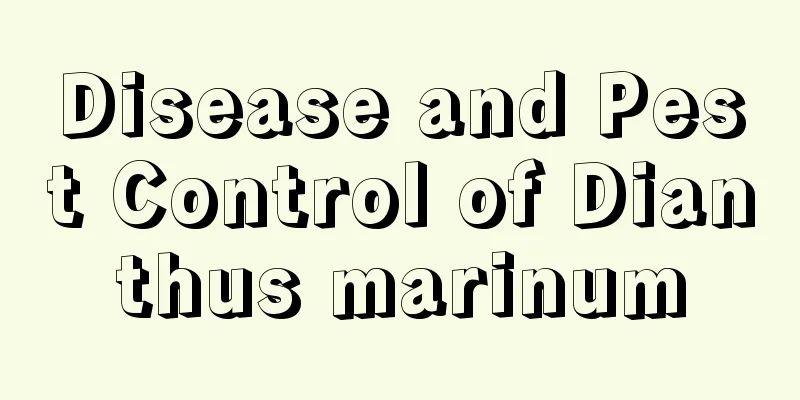Disease and Pest Control of Dianthus marinum

1. RustThis is a very common pathogen that basically appears on the leaves of plants and sometimes on the stems of plants, forming small raised blisters. Generally speaking, its spores are brown or purple-black powder, appearing on the body of the sea pink and forming small blisters. Although the sea dianthus itself will not die after the onset of this disease and will still be alive, it will not live well. Not only will it become thin and weak, but it will also not grow, so we still need to be vigilant. 1. Physical preventionMake sure the soil is loose to prevent water accumulation during planting. Pay attention to ventilation, clean the flower pots regularly, and apply fertilizer appropriately to prevent excessive nitrogen in the soil. If the planting area is relatively wide, you should be careful when choosing a site, and choose a relatively high place with good drainage. 2. Pathogen eliminationFor plants that are already sick, immediate response should be taken. The sick plants should be removed as soon as possible, gathered together, and burned and destroyed to prevent the pathogens from continuing to spread and harming other branches. 3. Chemical controlIn daily care, 63% of Mancozeb should be selected and prepared into a 600-fold solution for prevention and treatment. If the disease has already occurred, there are three types of pesticides that can be chosen to treat the plants, namely, fenadone, sodium carboxin and carboxin-ethyl, respectively. 2. Red spiderThis is a common pest that often harms various types of plants. During the winter, they will lay eggs to ensure the survival of their offspring. After a winter, the eggs will begin to hatch in March. The incubation time varies, and it will generally not be fully hatched until April, causing harm. 1. Prevention and treatmentFor red spider mites, you can use pesticides to eliminate them. In serious cases, you can use some special drugs to prepare a spray, or use cypermethrin emulsifiable concentrate for prevention and control. In addition, the use of mite-killing agent and cypermethrin emulsifiable concentrate can also achieve good prevention and control effects. In order to better prevent and control, new lipid membranes can be added to pesticides to enhance their effectiveness. |
<<: Disease and insect pest control of blood orchid
>>: Disease and insect pest control of sheep alopecia
Recommend
How many years does Dongkui bayberry bear fruit?
Introduction to Planting Dongkui Bayberry Dongkui...
Advantages and disadvantages of Charming Wave Rose
Charming Wave was bred in the Netherlands in 2014...
What to do if fern leaves turn yellow or roots rot
Causes of yellowing leaves and root rot in ferns ...
How to fertilize marigolds
How to grow marigolds Marigolds are usually sown ...
Cutting propagation of Cordyline
Time for cutting propagation of Cordyline Cutting...
What are the effects of garlic? Can garlic enhance sexual function?
1. Efficacy 1. Antibacterial and anti-inflammator...
Hydroponic green radish
1. Hydroponic method 1. The branches of Chlorophy...
Is eggplant a fruit or a vegetable?
Is eggplant a fruit or a vegetable? Eggplant is a...
I used the secret recipe given by an old flower farmer, and the flower pots at home burst into bloom, without spending a penny!
Homemade nutrient soil, flowers grow faster with ...
What's the matter with the trunk and leaves of the fortune tree?
1. Soil caking 1. Reason: The money tree requires...
When is the best season to plant asparagus?
Asparagus Planting Season and Time Asparagus is s...
Contraindications of using pyrazosulfuron methyl
Pyrazosulfuron-methyl has a long-lasting effect a...
Reproduction of the flaming azalea
1. Cutting propagation In May and June, take 5 to...
Honey Sugar Plum Planting Conditions Planting Area Climate and Temperature Requirements
Introduction to Honey Plum Honey Sugar Plum is a ...
What are the cultivation methods and precautions of Golden Heart Chlorophytum
How to grow golden heart spider plant Golden Hear...









